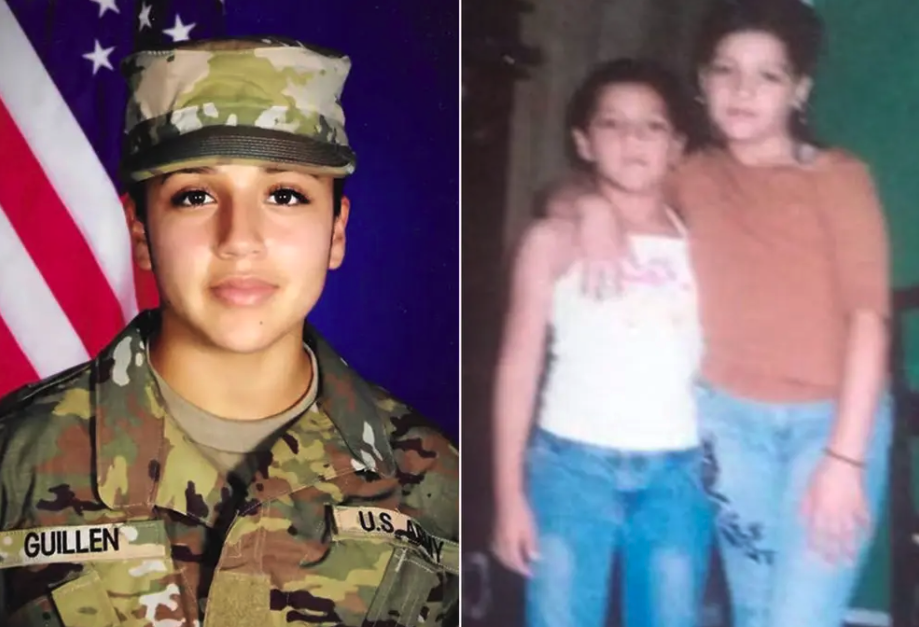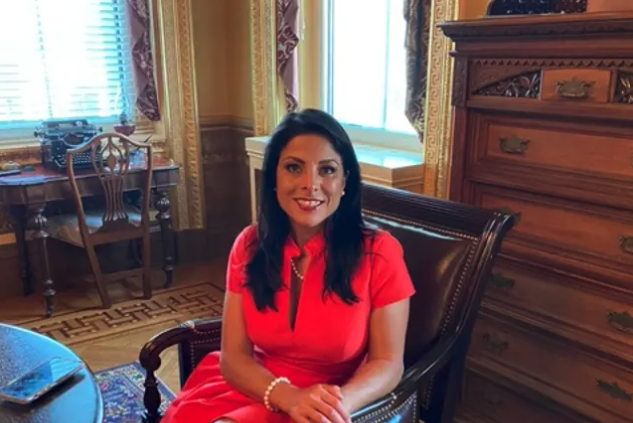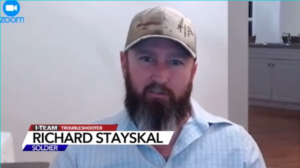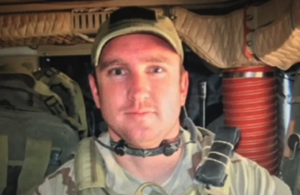Vanessa Guillen, 20, was a young Fort Hood soldier when she confided to her mother that she was being sexually harassed. Within months, she was dead. Her older sister tells Sheila Flynn how the family’s American dream for Vanessa turned into a nightmare – and how they’re fighting for other military victims.
Mayra Guillen and her little sister had a code.
The older sibling, born just a year and a few months before Vanessa, hated talking on the phone. She and their other family members mostly used texting for casual conversations; if anyone made an actual phone call, the agreement was that you answered.
It was important.
So when Mayra repeatedly called Vanessa in April 2020 and got no response – after friends and relatives realized the young Army soldier had been uncharacteristically silent – the big sister knew something was dreadfully wrong.

She hopped in the car and drove three hours from the family home in Houston to Fort Hood, where Vanessa was stationed. That’s when Mayra’s fears deepened – and when she first spotted a man who made her want “to throw up,” the 23-year-old tells The Independent.
That man was Aaron David Robinson, a 20-year-old from suburban Chicago who was specializing along with Vanessa in small arms artillery, Mayra says.
“He stood out from everyone” so she asked another soldier who the man was.
“When he told me, ‘Oh, that’s Robinson. He’s also in armour – and he was one of the last people who’d seen her’ … that’s when I instantly felt my heart drop,” Mayra says.
“When I saw him that morning, I just felt the energy towards him was off. And I just felt in my heart that either he knew something or he had something to do with the disappearance of my sister.”
She continues: “I saw him again at the Military Police office and … he was being very abnormal, very impatient – and eventually when he does look at me because I’m there crying, trying to keep composure – he just laughs as he’s walking out.
“And that’s when I’m like, ‘This guy, right there’. I knew in my heart that it was him, that he had something to do with it. But I had no way of saying, no evidence, nothing. And people would just think I was crazy if I did point him out without even knowing him.”
Her instincts were right, however. Just over two months later, after an agonising period of not knowing anything about Vanessa’s fate, partial remains that would eventually be identified as her sister’s were discovered near the Leon River.
Hours later, Robinson shot himself dead. He is Vanessa’s presumed killer.
The case transfixed the nation and raised more questions than answers – particularly about sexual assault within the military. Vanessa’s family – who’d never imagined themselves as public advocates for anything, Mayra tells The Independent – have within two years helped get new legislation passed to protect victims like her.
There’s a lot of anger, says Mayra, and the Guillen’s have directed that into advocacy. Their attitude towards the military and its procedures is in stark contrast to how they felt when Vanessa enlisted – shipping off three days after her high school graduation.
She’d been impressed by cousins and uncles who’d served in the military, both in Mexico and the States, Mayra says. Vanessa was the second-oldest of six children born to Mexican immigrant parents, raised in Houston in a family of siblings who loved to play outside.
She was shy but athletic, Mayra tells The Independent; it became apparent in high school that she was seriously considering joining the military, following in the family footsteps.
“She was very much in between starting a career in soccer – pursing being a professionals soccer player someday – or entering the military,” Mayra says. “She was very indecisive between both things, but in the end, she did pick the military. I feel like she was very inspired by it.”
Vanessa shipped off to South Carolina – the first of her immediate family to travel anywhere in the US outside of Texas, Mayra says. Mayra was the only one who travelled to Vanessa’s graduation ceremony to represent a clan that was fiercely proud of their teenage daughter realising the American dream.
“I felt very honored to have a sister that was currently serving,” Mayra says. “It was something that we were all very happy about. You see the uniform and you think about America … just how her serving for a country her parents weren’t originally from but wanting to follow the dream and help my parents out, in a way – and show my parents that their efforts of coming here were strong enough to have Vanessa be driven to serve.”
Following South Carolina, Vanessa spent a few months in Virginia and “was as happy as she could ever be”, Mayra says.
“She met so many new friends; she was picking which career path she would choose – pretty much everything was really good for her. You could see it in her eyes, in her face, in her smile. She was just brighter than ever.”
Vanessa next ended up back in Texas, happy to serve at Fort Hood within driving distance of her close-knit family. But her frequent visits home would soon reveal that her military experience was no longer as positive as it once had been.
“We did start seeing her appearance – and just her spirit, herself – changing,” Mayra tells The Independent. “And that was after she was [at Fort Hood] for a couple of months.
“I grasped it in January of the year of 2020, and it was just her demeanor was very different. You could see she had a hard time sleeping or just that she wasn’t as talkative or joyful as she was in the past.
“It did bring up some concerns.”
The soldier tried to pass it off as the result of early mornings and hard physical labor, but the girls’ mother eventually cornered Vanessa – and got her to admit that something serious was going on at Fort Hood, Mayra says.
“That’s when Vanessa fully opened up to my mom that there was somebody sexually harassing her at the base, but that she really couldn’t do much about it – and if she did do something about it, it was going to be on her own and in her own way,” Mayra says.
While her mother was prone to “overreacting”, Mayra adds, “Vanessa didn’t let her. My mom respected her decision and it went from there.
“Sadly, she went missing, and that’s when everything was pretty much uncovered.”
Mayra and the rest of the family had been completely unaware of the harassment situation until after Vanessa went missing – and it would still be months until they found the soldier’s remains and more details would emerge.
Vanessa was discovered on June 30, 2020 – and Robinson took his own life in the early hours of 1 July. His girlfriend, Cecily Anne Aguilar, who was also the estranged wife of another soldier, was soon indicted on 11 counts relating to Vanessa’s death. Fourteen Army leaders were also fired or suspended after an investigation into the military’s handling of sexual complaints found serious lapses.
A US Special Army investigation released in April 2021 determined that Vanessa had been sexually harassed on two occasions by a supervisor who is not by the man suspected of her murder.
The Guillens were repeatedly let down by the military’s efforts and answers, Mayra tells The Independent – beginning with the older sister’s arrival on base and the admission by Vanessa’s superiors that they’d lost track of the young soldier for the majority of a day.
“Something felt very odd and, at that time, I kind of felt that she was in danger – and I would tell them, ‘You guys have to look for her,’” Mayra tells The Independent. “There wasn’t much cooperation. They said that I would have to go file a report first with the MPs … and, at the very moment when I stepped into that office, I was like, ‘This has to be a joke’.
“The officer questioning me barely knew what her name was, and I felt like I was being questioned by a child – and I was getting very frustrated.”
Her experience at Fort Hood, and the tragedy of Vanessa’s death, was hard to reconcile with the family’s perception of the US Armed Forces, she says.
“You think of the military, you think of honor and such – and you don’t think anything negative of it, because your loved one’s fighting for freedom,” she says. “And it was hard for us to ever think of anything negative … nothing regarding, you know, the darkness behind everything.”
They’ve had their eyes opened to that “darkness” since, though – particularly with the help of a lawyer and advocate Natalie Khawam, who first came across problematic military procedures during a pro bono case, she tells The Independent.
She couldn’t believe what she heard from soldiers and veterans and, the deeper she delved, the more incredulous she became. She also became more determined to fight the system – and systemic problems says the founder of the Whistleblower Law Firm in Tampa, Florida.
Prior to coming into contact with the Guillen’s, she’d dealt with a female soldier who’d been raped and a male service member who alleged medical malpractice by the military. Ms. Khawam – a first-generation immigrant like Vanessa and Mayra – began identifying and investigating more and more areas of concern regarding military matters.
“It was an antiquated system that made no sense to me – and every time I peeked into it, looked into it … I got really disgusted by the lack of respect I saw, and accountability, that our military showed towards sexual assault and sexual harassment victims,” she tells The Independent. “I care because it’s a human rights issue. To me, it’s a violation of … human issues, human rights issues.”
As the issue of sexual assault and harassment continued to gain traction in the civilian sphere as she committed to the Guillens’ case, she says, she realized there were still serious strides to be made regarding such awareness in the armed forces.
“The biggest strategy call was to make sure this became a household issue … because this was a military issue,” Ms. Khawam tells The Independent. “People, they kind of knew about MeToo, but they never knew about the military sexual assaults – because [they think] ‘I’m not in the military, why should it bother me?’ Most people are like that.
‘I really believe … when you bring awareness to something, you can help bring justice to it. Whenever you expose something, you bring awareness, and when you bring awareness, you can bring change.

“I wanted people to watch Good Morning America … and that way people are talking about it, and when people are talking about it, they get involved. People like to see change and have people feel like they’re part of that change of bringing justice to help people.”
The joint efforts of Ms. Khawam and the dogged Guillen’s have already yielded such change. Last month, President Joe Biden signed into law the National Defense Authorization Act, which incorporates provisions of the I Am Vanessa Guillen Act.
A major problem in the military – one which relatives believe led Vanessa Guillen to avoid informing superiors of harassment issues – is that direct commanders were historically assigned to investigate allegations, meaning they most likely had personal relationships with both accusers and accused.
Under the new legislation, which took effect on 1 January, those commanders will no longer be involved in such investigations.
Vanessa’s family, her lawyer, and scores of other advocates believe reforms must go much further, however.
“Right now, it’s like a pat on the back – and sorry, ‘Thank you for your service’ is not enough to me,’” Ms. Khawam tells The Independent.
“If a gymnast can get paid $420million for being assaulted, and an actress -– which, by the way, they are all rightfully entitled to; that’s what some court decided, that’s what I agree with, because that’s what they felt was comparable … our soldiers are entitled to not even a penny. A penny would be one cent more than they’re entitled to right now. They’re getting nothing.”
She says that the problems started not “necessarily in the courts; the problem is systemic. It was a cultural issue”.
Ms. Khawam tells The Independent: “Laws can be changed. It’s just the mentality. So you can have all the laws in place, but it’s whether they’re implementing them – whether they’re actually following through with their own codes … This is a bigger issue with the way that the military, as a whole, handles sexual assault and sexual harassment.
“I think it starts from the very beginning, from the start, where you report it … the way they mishandled reporting and swept it under the rug is what made me go, ‘Okay – it’s not the court itself. It’s the system. And the way that things are reported has to be changed.’”
The legislation brought into effect earlier this month is a major coup for the Guillen family and other groups that have been fighting for years for change – but Vanessa’s siblings, parents, and lawyer are committed to continuing their unexpected push for military justice, spurred on by the young soldier’s memory and spirit.
“What needs to be done next is the right to file claims, to make these families or victims whole, is what the next steps are that we’re going to be working on with Congress this year,” Ms. Khawam says.
In the meantime, in the Guillen family home in Houston, the first picture visible upon entry remains a photo of Vanessa in uniform, and Mayra carries a wallet-sized Army photo of her little sister in her phone case, she says.
“I always look at her picture and I’m like, ‘You left me so much work – but it’s okay. We’ve got this,’” Mayra says. “It’s funny, because we would talk to each other like that. And I’m pretty sure, I know, that she’s very proud to see what we’ve accomplished. And she’s more than happy to see that this wasn’t only in her honor but in honor of all the victims.”
Mayra says: “We’re getting constant messages of service members being thankful for such changes, and it’s basically what keeps me going to keep advocating for this … [Vanessa] was always a people person; she cared for people a lot – so I figure she’s very proud and happy of what we were able to do.”
Original article here.

 Call Now- Open 24/7
Call Now- Open 24/7



